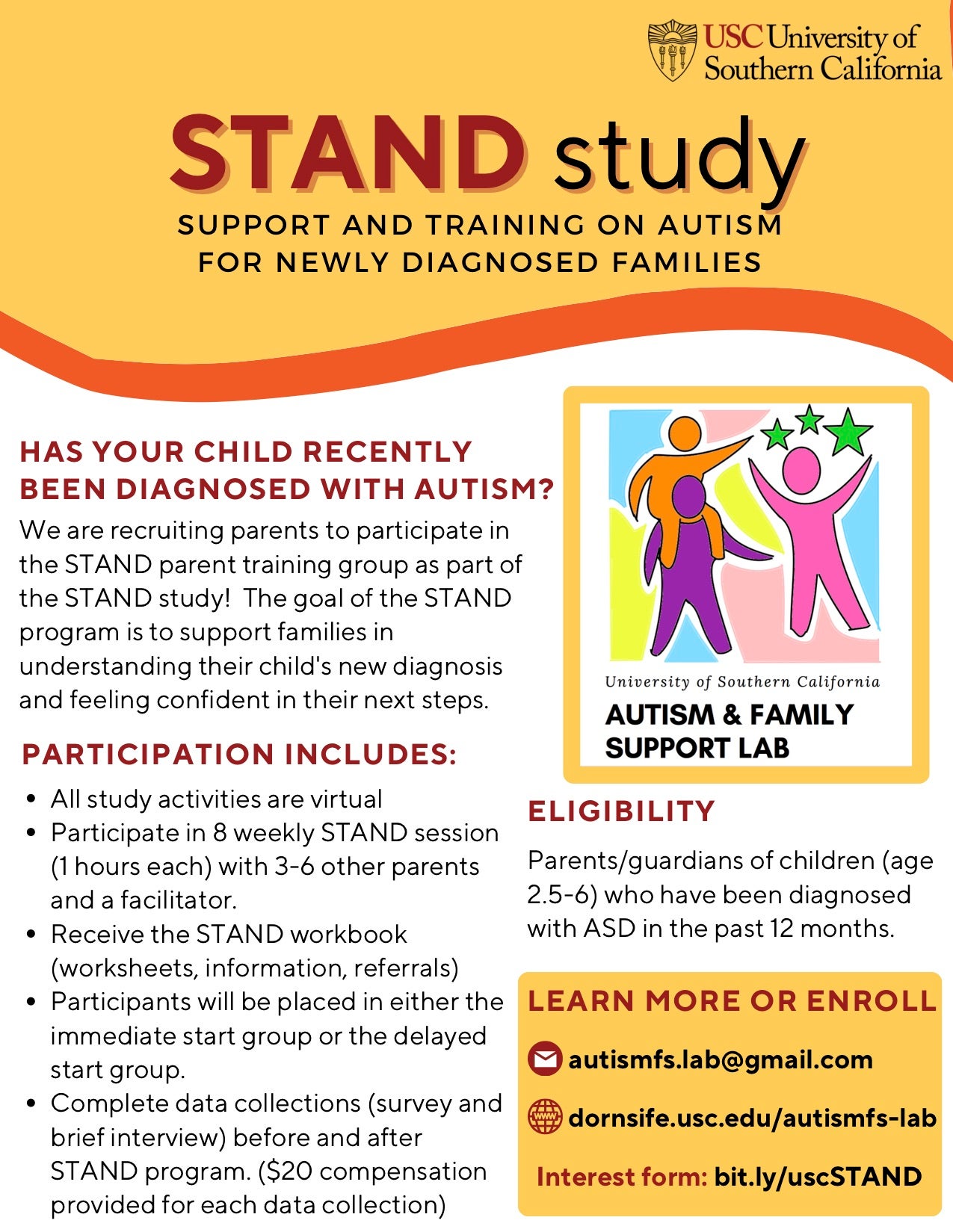Current Projects

The Support and Training on Autism for Newly Diagnosed Families (STAND) Pilot Study
Has your child recently been diagnosed with Autism Spectrum Disorder (ASD)? Do you find yourself overwhelmed and confused about what to do next and how to best support your child? The University of Southern California Autism and Family Support Lab is launching a new study that is testing the effectiveness of a parent program called STAND. The purpose of STAND is to help families feel more assured and confident in understanding and supporting their autistic child.
The Support and Training on Autism for Newly Diagnosed Families (STAND) program is a 8-week, virtual group for parents whose child was diagnosed with ASD in the past 9 months. Each of the eight sessions will last about one hour during which the group facilitator will provide information to and lead discussions with 4-7 parent participants. STAND sessions will be supplemented by a workbook with extra information, resources, and worksheets. Some of the topics covered in STAND include:
- Reliable information on autism spectrum disorder, available treatments and supports, and best practices in gaining treatments and supports.
- How to develop short and long term goals for your child which are consistent with what is important to you and your family.
- How to understand your child’s behavior, respond to their behavior, and support the development of their communication and emotion regulation skills.
- Best practices in talking about autism, advocating for your child, and accessing supports and services.
- How to prepare for your child and family’s future.
Because we are testing the effectiveness of the STAND program, half of the participants will be randomly assigned to begin the STAND program immediately after enrollment and the other half will begin the STAND program after a delay. We will be collecting data for all participants at enrollment, after 8 weeks, and again 8 weeks later. Data collections include a short virtual interview with a research team member and an online survey. Participants will receive a $20 amazon gift card for each data collection (total $60 possible for all data collections) as compensation for their time.
Eligible participants are legal guardians of a child, age 2.5 – 6 years, who has received a diagnosis of autism spectrum disorder within 12 months of enrollment. To sign up or learn more: send us an email at auitsmfs.lab@gmail.com or complete the google form bit.ly/uscSTAND
Recruitment is currently open for the group starting in January 2024.

Previous Projects
The Impacts of the COVID-19 Pandemic on Therapy Utilization Among Racially/Ethnically and Socio-Economically Diverse Children with Autism Spectrum Disorder
Published in the Journal of Autism and Developmental Disorders, February 2023
https://link.springer.com/article/10.1007/s10803-023-05905-y
Early research on the impacts of the COVID-19 pandemic on children with autism spectrum disorder (ASD) provides preliminary evidence of ASD related service disruption and worsening behavioral and affective outcomes. This study aims to add to this literature by describing change in hours of ABA therapy before and through the COVID-19 pandemic and by evaluating if there is differential disruption based on the race/ethnicity and socio-economic status of the child. Additionally, this study utilizes an extended structure-process-outcome model to interpret the implication of the findings for the quality of the ABA therapy care system as a whole and in the context of patient variability and environmental stress. Research questions are evaluated using retrospective clinical data on client therapy utilization from ABA clinics across California.
We found that therapy utilization dropped during the first three months of the pandemic (-10.65 h/month; p < .001) and increased during the following 9 months (2.39 h/month; p < .001). Moderator analyses revelated that Asian, Non-Latinx and school-district funded children had significantly different trajectories of change in therapy utilization compared to white, non-Latinx participants and private insurance funded participants, respectively. Findings suggest that utilization of ABA therapy was disrupted for a full year following the onset of the COVID-19 pandemic and that child race/ethnicity and primary payer influenced the degree to which autistic children were impacted by service disruption. These findings have implications for autistic children who lost therapy access during key developmental periods and for the ABA care delivery system.